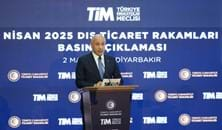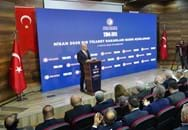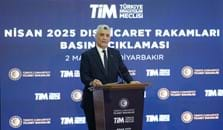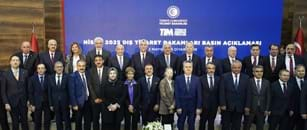Türkiye's April Exports Reached 20.9 Billion USD
Automotive retained its leading position among export sectors in April with 3.1 billion USD. Chemicals followed with 2.6 billion USD, while the electrical and electronics sector ranked third with 1.38 billion USD.
Türkiye Exporters Assembly Chairman Mustafa Gültepe stated, “Last month, the parity contributed 443.6 million USD to our exports. Should the parity remain at current levels, we foresee a 1.3% positive impact on our annual exports.”
Türkiye's exports in April amounted to 20.9 billion USD. In 2025, exports in the first four months reached 86.2 billion USD, and the 12-month cumulative exports climbed to 265 billion USD.
The April export figures were announced in Diyarbakır by Minister of Trade Prof. Dr. Ömer Bolat and Türkiye Exporters Assembly (TİM) Chairman Mustafa Gültepe.
Chairman Gültepe reminded that they embarked on 2025 with a target of 280 billion USD in exports. Emphasizing that they are currently behind the target despite closing the first four months in the positive, Gültepe continued:
“According to the General Trade System (GTS) records, we achieved exports worth 20.9 billion USD in April, reflecting an 8.5% increase compared to the same month last year. I must highlight that the relatively higher increase compared to the previous three months was partly due to the presence of two additional business days in this year's April calendar. Our exports in the January-April period reached 86.2 billion USD, while our 12-month cumulative exports hit 265 billion USD. We recorded a 4% rise in four-month exports and a 2.7% increase in annual exports. We estimate that service exports in April will amount to approximately 7.6 billion USD. Sectorally, automotive maintained its leadership with 3.1 billion USD, followed by chemicals with 2.6 billion USD, electrical-electronics with 1.38 billion USD, steel with 1.3 billion USD, and ready-to-wear with 1.2 billion USD. A total of 22 sectors increased their exports. The top five exporting provinces were İstanbul, Kocaeli, Bursa, İzmir, and Ankara. In April, 980 companies exported for the first time. Last month, the parity contributed 443.6 million USD to our exports.
Should the parity remain at these levels, we anticipate a 1.3% positive impact on our annual exports. The countries we exported to the most in April were Germany, the United Kingdom, the USA, Italy, and France. We recorded growth exceeding 50% in 63 countries and over 10% in 109 countries. Overall, we increased our exports to 143 countries.”
“Falling Oil and Commodity Prices Pose a Risk to Our Exports”
Addressing current issues, Mustafa Gültepe underlined that global trade developments present both risks and opportunities for Türkiye's exports. Gültepe stated:
“As of April, the Brent crude oil price dropped by 25% compared to a year ago, retreating to 62 USD. We know that the decline in oil prices is driven by the slowdown in global demand, tariff tensions between the USA and China, and higher-than-expected production increases by OPEC countries. This scenario presents a risk of revenue loss for economies reliant on energy and commodity exports.
According to the latest World Bank report, global commodity prices are expected to fall by 12% this year. These developments may impact our export performance. Falling oil and commodity prices pose a risk to our exports. We assess that the current levels of oil and commodity prices could lead to an annual 2% decline in our exports, while the decline in demand may cause an additional 1% negative impact. Taking into account the effects of the euro/dollar parity and U.S. policies, we project a combined negative impact of 1.7 percentage points on our exports. We are closely monitoring uncertainties in global trade and the rising trend of protectionism. According to the TİM Export Market Monitor, the Export Demand Index fell by 1.3 points and remained below the threshold. Recently, tariff tensions between the U.S. and China have come to the forefront in global trade. These tensions disrupt supply chains and weaken global growth expectations. The IMF reiterates its warning that trade conflicts will exert pressure on the global economy.”
“We Must Seek Ways to Minimize Input Costs”
Mustafa Gültepe emphasized that the developments necessitate more cautious and strategic action by exporters. To mitigate the potential damages of the process, Gültepe proposed the following:
-
We must seek ways to minimize input costs.
-
We should diversify our supply chains.
-
We must strengthen our resilience against external shocks.
-
We should further explore solutions that facilitate access to financing.
-
We must enhance mechanisms that can identify new market opportunities earlier.
-
Rather than acting solely with a defensive reflex against global adversities, we must interpret portunities accurately.
-
We must transform developments into a process through which we can create new breakthroughs in our exports.
“We Are Working Day and Night to Reach the 280 Billion USD Target”
Gültepe underlined that despite not achieving the desired increase in the first four months, they continue to work tirelessly towards reaching the year-end target of 280 billion USD. He announced that trade delegations would be dispatched this month to the USA, Spain, Iraq, Albania, Tunisia, and South Africa. Gültepe said, “Our firms have shown significant interest in the intensive delegation schedule. I invite all our firms to participate in our trade delegations, as the element of trust becomes even more prominent in times of heightened uncertainty. I believe we can turn this process into an opportunity through face-to-face communication we will establish via these delegations.”



